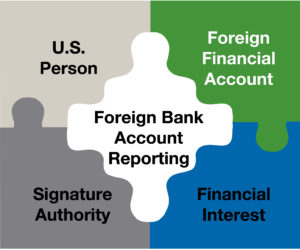Secret Foreign Bank Accounts
 Secret foreign bank accounts have been at the center of money laundering. This is especially with reference to offshore bank accounts. It is very common for people to hide money in secret foreign bank accounts in other countries in an effort to avoid paying taxes on the monies.
Secret foreign bank accounts have been at the center of money laundering. This is especially with reference to offshore bank accounts. It is very common for people to hide money in secret foreign bank accounts in other countries in an effort to avoid paying taxes on the monies.
A Case Where a Businessmen & Attorney Collude to Hide Money in Secret Foreign Bank Accounts
In the case, United States v. Kerr, D. Ariz., No. 2:11-cr-02385, which Bloomberg reports, two businessmen and an attorney were charged in U.S. District Court for the District of Arizona for hiding more than $8,000 million in assets in foreign bank accounts that were kept a secret.
The prominent Phoenix businessmen, Stephen M. Kerr & Michael Quiel, solicited the services of a former San Diego attorney in committing this crime.
The attorney, Christopher M. Rusch, assisted the two businessmen to set up secret foreign bank accounts Switzerland. The Swiss accounts were set up in the name of nominee entities concealing the identity of Kerr and Quiel as the owners of the bank accounts. They then went ahead and deposited millions in these secret foreign bank accounts from sale of stock they had concealed their ownership in acquiring. All this while, Rusch acted as a signatory authority to these secret accounts. He carried out all the transactions on these accounts on behalf of Kerr and Quiel.
The Role of the Attorney
Rusch, focused on criminal and civil tax defense, creating and maintaining offshore accounts among other things. He was a master in setting up these offshore accounts and was not left out in using them too. He also maintained secret foreign bank accounts in Switzerland and Panama. He went against the statement “preach water and drink wine.” He actually preached the water and drank it, or how else can you convince clients to hide money in secret foreign bank accounts. At one point, he helped Kerr to purchase a golf course in Colorado from his secret accounts. He actually did this using his nominee Panamanian entity. As if that was not enough, he helped Kerr and Queil to use the hidden money in the secret foreign bank accounts at their comfort back in the U.S. by transferring funds to them through his client trust account.
Charges
You cannot hide from the law for so long. Rusch was sure they will never be found or may be the deal he got from this two business men was too sweet to be ignored. Either way, he was at the center of breaking the law by aiding money laundering and in the promoting tax evasion. IRS and the government proved too smart to be outsmarted when they caught up with the three.
Kerr and Queil were each convicted of two counts of filing false individual tax returns for 2007 and 2008. In addition, Kerr was charged with failing to file FBARs (Report of Foreign Bank and Financial Accounts) for 2007 and 2008. Rusch, pleaded guilty to conspiracy to defraud the government and failing to file an FBAR.
In case you have found yourself in the above situation, contact us for help. It is getting hard to run from the law with the IRS intensifying its search on these secret foreign bank accounts.

 Failure to file
Failure to file 

